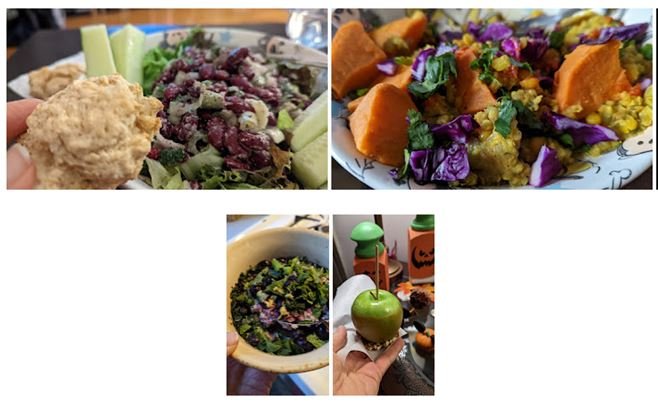An upcoming dental surgery led me to planning my meals a bit differently this week…I’ll enjoy plenty of crunchy foods the days before surgery, and focus on soft foods for the day of the procedure as well as the recovery days ahead. The nurse informed me that had I been scheduled to receive multiple dental implants, a post-surgery liquid diet might have been in order. I’ll be prepared either way, and anticipate that I may lose my appetite the day of surgery due to stress, fatigue, bruising, swelling, and pain.
Sleep, as well as nutrition, are wonderful recovery tools.
Shown here are a few of the foods that I will feast on beforehand to satisfy my craving for crunchy foods. Additional dishes are the healing and supportive foods that will nourish me during recovery. And yes…I did make myself a vegan peanut butter caramel apple that I enjoyed last night…Forks Over Knives recipe here. Also shown is the Plant Strong homemade version of Kitchari served with sweet potatoes/cilantro/red cabbage/lime, oatmeal with blueberries/lemon zest/collard greens, the 2-ingredient Apple Rolls from Kirbie’s Cravings, and a kidney bean salad served over red lettuce. Not shown are mashed Yukon gold potatoes, roasted acorn squash, guacamole and baked corn tortillas (for dinner the evening before surgery - one last crunchy food), and vegetable soup.
Whatever type of procedure you are scheduled for, advance preparation can save time, money, and resources…especially for older adults who are living alone.
The excerpt below from Butternut to Bionic: A Resource Guide for Hip Replacement Surgery, Chapter 3, pg. 54-55, discusses the importance of nutrition after surgery:
Nourishment
After surgery, most people will regain an appetite quickly and are ready for a meal within an hour or so after waking. You may experience an upset stomach - trust your instincts, you will know if you feel like eating. This is a time when your body is in dire need of nutrients and quality calories. After all, you have survived a lengthy surgery and traumatic procedure. Your taste buds may guide your eyes on the hospital menu…but use common sense and choose your meals wisely. Hospital menus are designed by registered dietitians and now more than ever you’ll discover tasty, appetizing, and beautiful meals to help you get well. Hospital menus offer heart-friendly dishes, vegan options, low-sodium meals, and typically, a calorie count. Do yourself a favor and treat your body to a wholesome feast. Your body is full of anesthesia - the chemicals that were used to put you to sleep during the operation also put your colon to sleep. Eating lots of fiber and foods rich in vitamins will help support powerful detoxifying organs such as your liver and stimulate your intestines. This is my delicate way of saying…you want to have a bowel movement on your own before leaving the hospital. A sleepy colon is not pleasant and after a few days will feel very uncomfortable! If things don’t get moving on your own, the nursing staff will be happy to give you an enema. That isn’t my idea of a good time. Food is your friend, especially foods high in fiber.
Food, meal plans, and diet are touchy subjects. This is not a diet book. My suggestions are based on personal experience, my educational background, and simply put, what has worked for me. I offer these suggestions as a way to assist you toward a strong recovery and improved health.
-Author, Tiffany Anderson
Please visit Anderson Therapeutics and take advantage of the FREE resources, tools, and tips, including my 3 Key Concepts to Improved Health.
Be Well. ~Tiffany Anderson, LMT, RMT, BS, CHES, Founder, Anderson Therapeutics
Author, Butternut to Bionic: A Resource Guide for Hip Replacement Surgery



